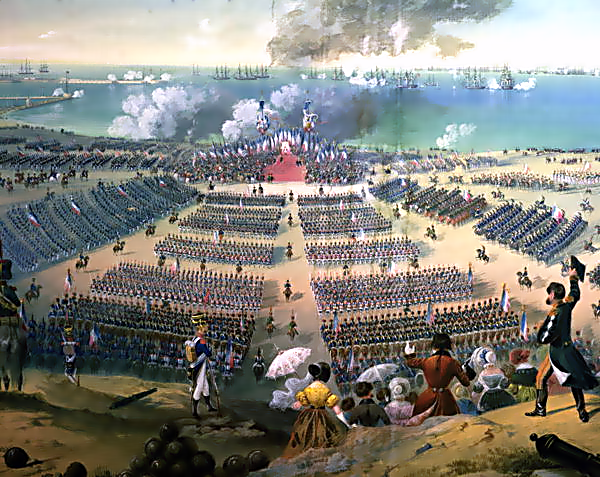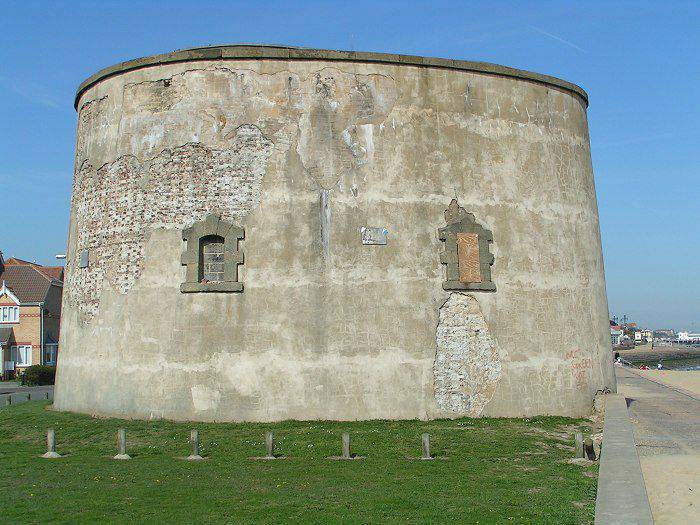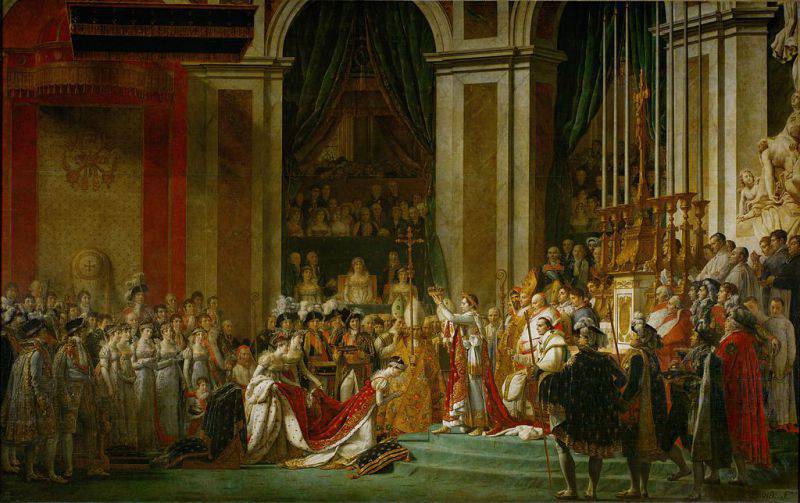England vs Russia. Getting involved in a war with France. Part of 2
Napoleon occupied the whole of Hanover, a German possession that belonged to the English king, who was also a Hanover elector at the same time. Then the French troops occupied a number of points in southern Italy, where there were no French troops yet. Napoleon ordered the Netherlands and Spain to deploy the fleet and troops to the aid of France. He ordered the confiscation of British goods in all subordinate lands, the arrest of all Englishmen who were in France, and to keep them until peace with the British.
Napoleon used a pause before a decisive clash with England for the preparation of a landing force to England. On the coast of France, near Boulogne, a huge military camp was established. Napoleon planned to strike directly into the heart of the enemy, hit Britain on its islands, dictate peace to the British on the banks of the Thames.
In Boulogne camp, work was in full swing day and night. Thousands of people worked hard on the construction of new ships, transport ships, landing barges. Everything that could stay on the water was mobilized. From 1803 to 1805, Napoleon’s army of 180-200 thousand people, the so-called. The English army was assembled and trained in camps in Boulogne, Bruges and Montreux. The best French generals - Ney, Davout, Soult, Lannes, Marmont, Augereau, Murat - commanded the corps that were supposed to launch an offensive in England. The whole was built flotilla transports and rowing vessels, which were located in French ports on the English Channel and the Netherlands. All of Europe followed the French preparations with great attention.
Napoleon's plan at the same time seemed real and impracticable. Britain seemed well within reach. From France, it is separated only by a narrow strait. England did not have a strong army capable of resisting Napoleon’s forces. England did not have famous commanders like France. In fact, London could not confront the French army on its territory. Napoleon himself was looking forward to a quick victory. “I only need three nights of fog — and I will be the master of London, the parliament, the Bank of England,” he said. Misty night and the French army will make a shot across the English Channel and London will be brought to its knees. However, on the other hand, much depended on the fleet. The British had an advantage in the navy.
The British themselves were afraid of Napoleon’s landing army. Already later, when the landing did not take place, many began to ridicule Napoleon’s plans to land the army in England. But from the end of 1803, and especially in 1804, the English had no time for laughter. England had not experienced such fear since the time when they were waiting for the arrival of the Spanish Invincible Armada in 1588. The British Government received the most alarming news of the immense scale of Napoleon's preparations. A first-class huge, well-equipped army stood in Boulogne and waited for the English Channel and the signal to board the ships. The British remembered that Napoleon in 1798 was able to slip away with a large squadron and a large army from the British fleet, which was chasing the French throughout the Mediterranean, to land safely in Egypt, and along the way to capture Malta. Such a person was worth fear.

Inspection of the troops in Boulogne
Therefore, England is actively preparing to repel the landing. Formed troops, like the people's militia. In areas closest to France, new fortifications were built, and existing ones were completed or improved. So-called “Martello Towers” were built on the south coast of England. So called round stone fortifications.
During the revolutionary wars, the British, led by Admiral John Moore, ran into great difficulties in taking the Genoese tower on the Corsican cape Martel. The garrison entrenched in the fortification for a long time did not allow the numerically superior enemy to the city of Saint-Florent lying just below. The combat potential of the tower Martel made such an impression on the British command that in case of the invasion of the French troops, it was decided to build similar structures along the shores of all British possessions, both in the metropolis and in the colonies. The standard tower had two floors and reached a height of 40 feet (12 meters). It housed a small garrison to 25 soldiers led by an officer. The walls of thick stone blocks were resistant to artillery fire. On the flat roof was placed a gun that was able to rotate 360 degrees. Some towers were surrounded by a moat. In addition, the British squadrons began an intensified blockade of the French and Spanish fleets, without which the successful implementation of Napoleon’s plan was impossible.

Martello Tower on the east coast of England
At the same time, London, sparing no gold, actively knocked down the anti-French coalition of European powers. The European powers were to attack France from the east and prevent Napoleon from invading England. However, the case was delayed. Austria suffered a terrible defeat in the previous war, lost a lot and, although it wanted revenge, but was afraid. The Prussian king hesitated. Prussia was concerned about the strengthening of France on the Rhine, but did not want to fight. Russia has not yet determined its position.
There remains one more measure - to eliminate Napoleon himself. London sheltered French royalists and they dreamed of killing Napoleon. However, in France it was much more difficult to organize an “apoplexy attack” that befell the Russian Tsar in his bedroom. At the court of Napoleon, there were neither irritated Guards officers, nor high-ranking nobles who hated the first consul, who could remove loyal officers and soldiers from the guard. Therefore, for the assassination attempt on Napoleon, I had to use a fanatical grand royalist, the leader of the Chouans and the Breton rebels, Jean Chadudal.
The Breton fanatic had to eliminate the first consul, that is, suddenly attack him, accompanied by several armed men, when he would ride alone near his country palace in Malmaison, take him away and kill him. Georges Cadudal was completely devoted to his work and calmly went to the "cause", as he saw in Napoleon the main obstacle that prevented the legitimate king, Louis Bourbon, from taking the throne of France. In August, Cadoudal and his comrades were landed by an English ship on the Normandy coast and immediately headed for Paris. There were people, money, connections in the capital, secret addresses and safe havens.
The conspirators planned to establish contact with the man who, after the removal of Napoleon, would take power into his hands and invite the Bourbons to the throne. Such a man royalists and the British set out in the person of General Moreau, who was popular in the army and the people, and another general, Pichegru, who was exiled to Guyana but managed to escape from there and lived illegally in Paris, became the intermediary in relations. Moreau hated Napoleon, but did not want to serve the Bourbons and doubted. However, he learned about the conspiracy and did not inform.
While there were negotiations, the police tracked down and informed the first consul about the situation. 15 February 1804, General Moreau was arrested in his apartment, and eight days later, Pichegru was also arrested. Then the brothers Princes Polignacs and the Marquis de Rivières were arrested, they were adjutants of the Count d'Artois, brother of the king. General Murat was appointed military governor of Paris. Kadudal was taken later - in March and in June 1804 was executed. Moreau was expelled from France.
Napoleon was furious at this Anglo-royalist conspiracy. He decided to strike back, put the Bourbons in place. From the time of the first arrests, all the defendants who testified unanimously said that at the time of the attempt one of the members of the royal house was to arrive in France. Here it became known that the prince is in the duchy of Baden. It was not d'Artois, as everyone thought, but Louis-Antoine de Bourbon-Conde, Duke of Enghien, one of the younger members of the royal family. As a result, Napoleon ordered the duke arrested and prosecuted.
On the night of 14 on 15 in March 1804, a detachment of French horse gendarmerie invaded Baden territory, arrested the Duke of Enghien, and took him immediately to France. March 20 Duke had already been brought to Paris and imprisoned in the Bois de Vincennes. On the evening of March 20, a military court gathered in the Castle of Vincennes. The Duke of Enghien was accused of receiving money from England and fighting against France. At three in the morning at a quarter to one, he was sentenced to death. At 3 in the morning, the Duke of Enghien was brought to the Vincennes moat and was shot here.
I must say that there is an opinion that the death of the Duke was a well-organized provocation. Napoleon simply did not have time to pardon the duke, he was not allowed to do this. The death of the prince caused the anger of the whole monarchical, feudal Europe. After all, he was a member of the royal family, a representative of the highest aristocracy. It was a blow to the whole of monarchical Europe, which greatly facilitated England’s process of putting together an anti-French coalition.
So in Petersburg, the indignation and indignation of the high society were infinite, although the Duke of Enghien had no relation to the national interests of the Russian Empire. The Minister of Foreign Affairs of the Russian Empire, Adam Chartaryi, prepared a declaration in which the French government was called the “den of robbers”. However, the note was not sent, Russia was not yet ready for war. But a month later, Petersburg demanded a harsh explanation of the murder.
Then Napoleon answered politely, but with a hidden meaning: “The complaint made by Russia today prompts the question: if it became known that people instigated by England prepare the murder of Paul and are a mile away from the Russian border, wouldn't they hurry to seize them? "It was an accurate and strong blow. Official Petersburg, where it was necessary to speak about the dead tsar with mournful awe and sadly uttered the foreign word “apoplexy” incomprehensible to ordinary people, everything that seemed to explain and hide, was directly asked about the assassination of Emperor Paul. After all, Alexander was aware of the conspiracy and did not inform his father about it. In addition, after ascending the throne, the young emperor Alexander did not punish the father’s murderers, although they did not run abroad and lived quietly in St. Petersburg.
Alexander did not forgive Napoleon. So, personal motives, emotions, skillfully excited from England, led to the fact that the invincible union of France, Prussia and Russia was no longer remembered. Rather, on the contrary, a different anti-French coalition was looming now - Britain, Austria and Russia.
At the same time, Napoleon challenges the Anglo-Saxon part of the western project. He decides, after three royal dynasties - the Merovingians, the Carolingians and the Capetians (with their two descending lines - Valois and the Bourbons) - to establish the "fourth dynasty" of Bonapartes. A republic that existed since 10 in August 1792 was to return to the monarchy again. At the same time, Napoleon decided not to wear the royal title like the previous dynasties, but to accept the title of emperor, first received by Charlemagne after his coronation in 800. and the legacy of Emperor Charlemagne.
However, Karl only tried to resurrect and continue another empire - the Roman Empire, which laid the foundations of Western civilization. Thus, Napoleon wanted to consider himself the heir and successor of not only the empire of Charles, but also the Roman Empire, the unifier of the countries of Western civilization. That is, Napoleon Bonaparte wanted to lead the entire Western civilization. At the same time, the Romanesque branch of the Western elite became the head of the West, and not the Anglo-Saxon. It was a challenge to England and all opponents of Napoleon.
18 On April 1804, the Senate issued a decree giving the first consul, Napoleon Bonaparte, the title of hereditary emperor of the French. But this was not enough for Napoleon. A symbolic continuity was needed between Karl and Napoleon, between Rome and Paris. Napoleon wished the Pope to personally participate in his forthcoming coronation, as was done a thousand years before him, in 800, with Charlemagne. At the same time, Napoleon decided to make a certain, but rather important amendment: Charlemagne himself went to Rome for his coronation to the Pope, and Napoleon wished the Pope to visit him in Paris. Pope Pius VII was forced to obey. Rome was under constant threat from the French forces stationed in northern and central Italy.
2 December 1804 in the Cathedral of Notre Dame in Paris, a solemn wedding and anointing for the kingdom of Napoleon took place. It must be said that the new French emperor introduced a symbolic change in the central act of the coronation, completely unexpected for the pope and contrary to the preliminary ruling of the ceremonial. When, at a solemn moment, Pope Pius VII began to raise the great imperial crown to put it on Napoleon's head, just as ten centuries before that predecessor Pius VII on the throne Petra put this crown on Karl's head, - Napoleon suddenly snatched the crown from the hands of his father and put it on his head. And then he laid another crown on his wife. Napoleon did not want to take the crown of anyone's hands, except for their own. He was forced to reckon with the church organization, with authority that obeyed a million people around the world, but he did not respect it. Napoleon looked at the clergy as if they were shamans, as people who consciously exploit human nonsense, acting through various rituals and manipulations inside and outside the church.
In the meantime, everything was ready for the landing in England. In February and March, 1804. Napoleon paid exceptional attention to the preparation of the operation. The landing army was ready. It was prepared about two and a half thousand transport vessels. London was gripped by anxiety.
The coronation of Napoleon in the Cathedral of Notre Dame 2 December 1804. Napoleon crowns Josephine
To be continued ...
- Alexander Samsonov
- War of the Third Coalition
England vs Russia. Drawing into war with france

Information